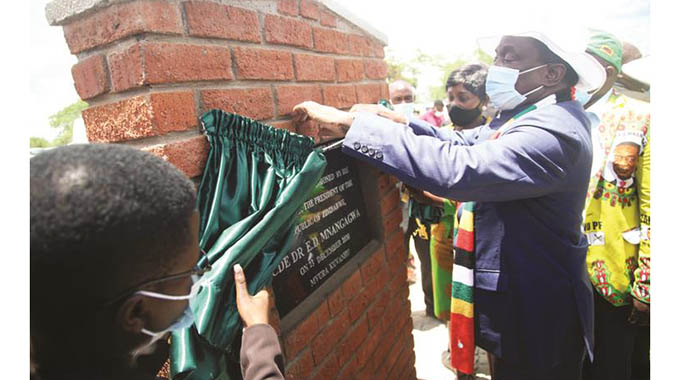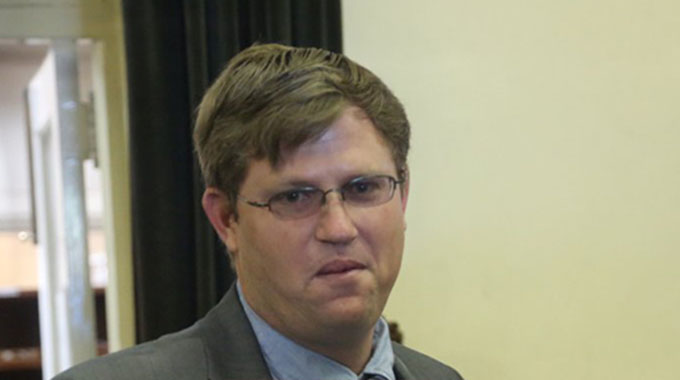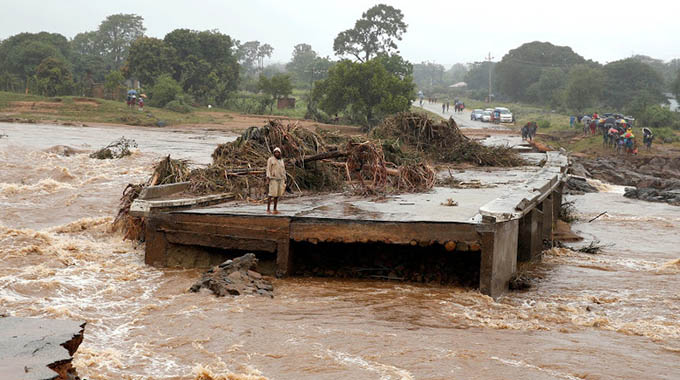Bright future beckons: President

George Maponga Masvingo Bureau
A bright future beckons for Zimbabwe underpinned by the ongoing use of local resources to drive socio-economic development, President Mnangagwa said yesterday while commissioning the $8 million Chombwe Piped Water Scheme in Chivi.
The project was financed through Government’s devolution funds.
President Mnangagwa said the devolution programme would transform the lives of the rural folk over the next five years through financing the development of piped water schemes that will supply water for domestic consumption, irrigation and livestock.
The Chombwe scheme had been mothballed for nearly 25 years owing to the breakdown of infrastructure to pump, store and convey water.
Nearly 10 000 households in arid Chivi North and Central constituencies will benefit from the scheme through the supply of piped raw water, with an estimated 5 000 hectares expected to be put under irrigation, boosting harvests and disposable incomes for surrounding communities.
Water is pumped from the perennial Tokwe River, downstream of the underused Muzhwi Dam and conveyed to homesteads, schools, clinics and business centres covering five wards between Mhandamabwe Business Centre and Chivi Growth Point.
The scheme will boost food security by supplying water to Pfumvudza plots, guaranteeing a year-round greenbelt in the dry north and central parts of Chivi.
Speaking to the media after touring the scheme’s water storage tanks at Chombwe Hill where he also planted a baobab tree, the tree of the year that he jokingly named Dambudzo, the President was upbeat about the nation’s prospects in food security after the replication of schemes like Chombwe in other parts of the country.
He hailed devolution saying under the Second Republic, communities would choose their own priority projects to drive development.
“What we now have is a situation whereby Harare will no longer dictate what is wanted in outlying parts of the country. Under the Second Republic, we now have a new way of doing things where communities decide their own projects that will be funded under devolution and we are very impressed with ground that has been covered in a short space of time with 74 projects having been funded in Masvingo this year alone which was impossible if Harare was dictating the pace like before,” said President Mnangagwa.
“Projects like this (Chombwe scheme) will be replicated in other parts of the country and after the coming of the Second Republic we were told of this mothballed project and decided to fund it under devolution and here we are today.
“So we will definitely undertake similar projects all parts of the country over the next five years.”
Government, under the Second Republic, wanted water schemes like Chombwe to give impetus to the Pfumvudza programme with plot holders gettint inputs to ensure year-round crop production even in dry regions like Chivi.
“We have started the war against hunger here in Chivi that will spread to all parts of the country within the next five years and we want our people to be able to grow enough food for themselves while also stocking GMB and growing other crops for sale.
“Our thrust is all year round crop production with schemes like these so there will be no excuse for failure,” said President Mnangagwa.
Besides crop production, communal farmers could also diversify into fruit trees while having sufficient water to grow their livestock herds for local consumption and export.
Zimbabwe was on course for a great leap forward in line with Vision 2030 and devolution would grow the Gross Domestic Product (GDP) of all provinces.
Government had already initiated an irrigation development programme that would see more than 200 000 hectares being transformed into a greenbelt using water from Masvingo’s many dams.
Winter maize in the Lowveld was already growing in leaps and bounds with over 4 000ha planted this year while plans were to expand to 10 000ha minimum, next year.
In his address to hundreds of people at Jenya Secondary School in Chivi North, President Mnangagwa highlighted inroads made by devolution funding hailing the programme as a game changer for the country’s economy.
“The future is bright. We can see that the future is bright. What has been a problem is the magnitude of hardships where we are coming from but the future is bright,” he said.
The Second Republic would not allow illegal sanctions imposed by the West to derail the country’s development agenda.
Government has already started widening of the Chirundu-Harare-Beitbridge Road to speed up movement of goods and human traffic with similar projects earmarked for other major roads such as Beitbridge-Bulawayo-Victoria Falls,Victoria Falls-Kazungula among others.
This was being done using local resources without any external funding.
“We decided to embark on the Beitbridge-Harare highway widening which is underway and we used local resources without any external borrowing which would have cost us US$2billion but now we are only doing it for US$600 million.”
President Mnangagwa said his Governmnet would continue investing in dams, roads and bridges using local resources to drive the economy.
Agriculture and mining would anchor that growth as Zimbabwe was endowed with many precious minerals which raised hopes of speedily attaining Vision 2030.
Government had also managed to stabilise the economy by running the country on a tight budget, needed to ensure sustainable growth.
For the first time next year, Zimbabwe was projecting economic growth of over four percent, a development previously frustrated by successive droughts.
Plans were also afoot to drill more than 5 000 boreholes to ease water woes countrywide over the next two years with procurement of rigs for drilling now underway.
The President said the current improvement in power supply was a harbinger of good times ahead.
He hailed the Education 5.0 concept, which has seen setting up of innovation hubs at local universities, saying local products were already in shops where they had surged to about 50 percent which he expected to grow to 80 percent over the next five years.
Import substitution remained Government’s priority in the short to medium term to grow the local industrial base.
President Mnangagwa handed over agricultural inputs to traditional leaders from Chivi and surrounding areas.
Earlier on, during the commissioning of Chombwe Scheme, Agriculture, Lands, Water and Rural Resettlement Minister Dr Anxious Masuka hailed the scheme as a game changer saying it would be replicated in other parts of the country as it supported nutritional gardens and orchads, thereby ensuring food security.
Dr Masuka said expansion of schemes similar to Chombwe in other parts of the country placed agriculture at the centre of Vision 2030.










Comments